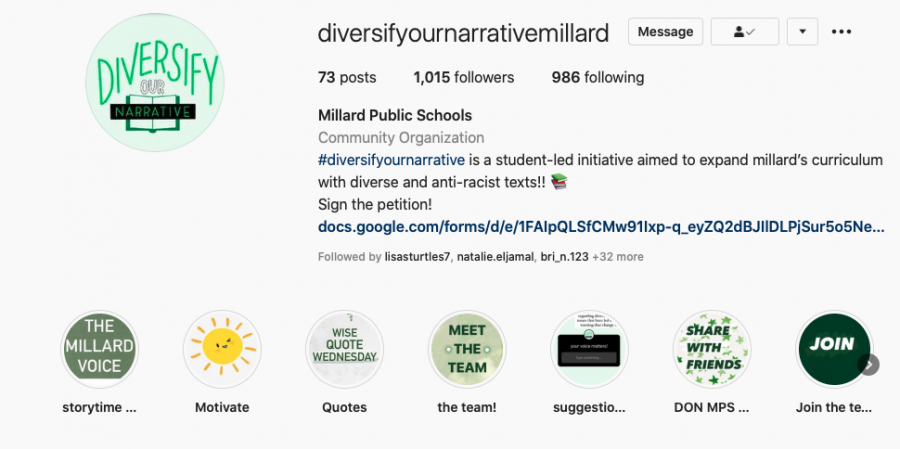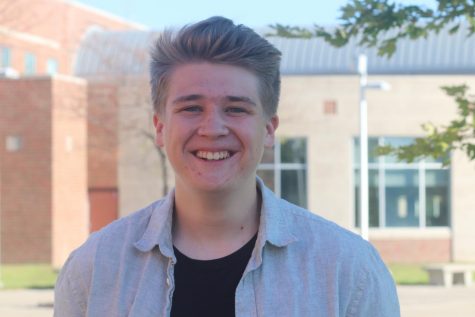America faced a racial reckoning last summer, Students are still calling for change
Millard’s local chapter of the national DiversifyOurNarrative initiative demands the district implement more books written by authors of color and members of the LGBTQ+ community in the English curriculum
Photo courtesy of DiversifyOurNarrativeMillard
Fighting for a more diverse curriculum in Millard, DiversifyOurNarrative aims to encourage students to learn about more perspectives. “We’re trying to eradicate any racism we can,” Millard North junior Shreeya Shapkota said. “We want curriculums to not be as Eurocentric as it currently is, so we want to include more perspectives from the eastern side of the hemisphere we don’t normally learn about.”
February 17, 2021
More than 2,000 cities. All 50 states. As much as 26 million people marching in the street and protesting racial injustice. After George Floyd died in a police arrest on May 26 last year, America saw its largest protest movement in its more than 200 year history. From Philadelphia to the Golden Gate Bridge, millions called for social and legislative change over the course of the summer.
And Millard West sophomore Megan Shepherd — joined by a group of peers from all three Millard high schools – called for educational change in the district.
“I established a chapter [of DiversifyOurNarrative] because it is important to appreciate and learn other cultures we may not be familiar with,” Shepherd said. “By including more books in our curriculum written by authors of color and authors of the LGBTQ+ community, students are able to learn more about experiences that differ from their own. It’s important to diversify what students are learning.”
DiversifyOurNarrative – a national student-led organization based mostly on social media – aims to encourage productive dialogues on race, religion and identity among students by implementing racially and religiously diverse texts in schools across the nation. Throughout the country local chapters are run by high school or college students; Shepherd, along with help from Millard North junior Shreeya Shapkota, created Instagram, Twitter and Facebook accounts last July to launch Millard’s chapter of DiversifyOurNarrative after speaking with the national organization. Currently its Instagram – the most active social media account – reaches its message out to over 1,000 followers.
“Right now social media is our biggest outlet, because we can’t go out and gather in fear of spreading [COVID-19],” Shapkota said. “We’re trying to eradicate any racism we can. We want curriculums to not be as Eurocentric as it currently is, so we want to include more perspectives from the eastern side of the hemisphere we don’t normally learn about.”
However, Millard’s chapter of DiversifyOurNarrative is not limited to only two members: a group of nine other high school students around the district help run social media accounts and connect with more students. On those platforms, posts explaining different racial, ethnic, religious, gender-related or sexual topics aim to give followers a diverse ingestion of media and expand knowledge about controversial or unnoticed issues. Students are able to make their voice heard to the leaders of DiversifyOurNarrative, namely with “Storytime Saturdays,” which allow students to anonymously discuss their experiences with racism and discrimination in Millard schools.
Further down the page is a petition available for students to sign, demanding Millard to include a minimum of at least one book in English curriculums written by a person of color about their experiences, at least one book be about Black experience to combat anti-Blackness and only fiction novels written after the 1960’s Civil Rights movement. These books are encouraged to be included in both standard and Advanced Placement courses.

“I’ve always wanted to inform people about what’s going on in the world regarding social injustices – not just in America – that our schools don’t talk about,” Millard West sophomore and a chapter Instagram Director Sarah Qaud said. “Here at Millard West – a predominantly white school – we can’t blame students for what the school isn’t teaching them. Amplifying minority voices is important everywhere, but it’s especially important students around the district are able to be heard.”
Nor is the initiative limited to social media. Shepherd, Millard West sophomore Kinzie Jones and Millard West junior Emily Plascencia Rojas all participate in Millard’s Diversity Council, which looks to confront racial injustice. Their participation not only helps DiversifyOurNarrative reach a wider audience, but also they have the opportunity to speak with district administrators about creating anti-racist curriculums.
“We have the chance to address specific issues in the social studies and English curriculums with the people who can help us create a more diverse education,” Shepherd said. “Our book list includes many titles we want to see implemented that better represent diversity in our student body. Our petition allowed us to have some credibility when talking with the district, because it shows many students want to see change – not just us.”
And that book list – composed of 26 different titles and authors – is at the forefront of DiversifyOurNarrative’s current aspirations. Not only is adding books to the curriculum a goal, but also removing texts like Harper Lee’s “To Kill a Mockingbird,” which Shepherd and Qaud describe as a white savior story, is also an end goal for the initiative. For many students, a more diverse set of texts is often overlooked but much needed.
“My friends didn’t know anything about Islam, the religion I practice or Arabic culture,” Qaud said. “So when I’m becoming friends with them, I’m informing them about issues that are happening and how I try to dismantle stereotypes. It gives them a different lens to become more aware that discrimination is happening in the United States and in our schools, and we need to stop that. One way is for schools to teach more perspectives and teach books by authors with more diverse backgrounds.”
Fighting for diversity and championing the voices of the unheard, DiversifyOurNarrative continues to educate students about the experiences of different races, ethnicities, religions and identities around the world. Though no curriculum changes in Millard have come yet, the organization still posts on social media twice a week and continues its discussions with district administrators at the monthly Diversity Council meetings. To see how DiversifyOurNarrative’s Millard chapter has been working towards its goals, visit its Instagram page at https://www.instagram.com/diversifyournarrativemillard/.








